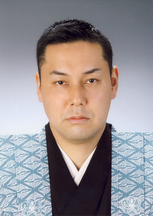豊竹 呂勢大夫(とよたけ ろせたゆう)
《人形浄瑠璃文楽 太夫》
17th Award-Winner(2013)
TOYOTAKE Rosetayū
Bunraku Puppet Theatre Chant (Ningyō Jōruri)
→日本伝統文化振興財団賞贈呈式の様子はこちら
[贈賞理由]
人形浄瑠璃文楽太夫として、語り口の爽やかな美声と豊かな声量は、明快にして新鮮な芸風を生み出し、大きな魅力となっている。本格の時代物をこなす力量をもつ一方、新作物にも力を発揮して芸域を広げるなど、次代の文楽を担う太夫として大きな期待が寄せられている。
Reasons for award
Toyotake Rosetayū is a chanter (tayū) in the genre of Bunraku puppet theatre (Ningyō Jōruri) with a beautiful voice of ample volume and an attractive narrative style. His florid and fresh artistry captivates all who hear him perform. As a tayū who can be expected to play a central role in the Bunraku theatre over the coming years, Toyotake Rosetayū is an artist with the capacity to tackle the most demanding roles in historical dramas while expanding his range of artistic activity to the performance of new works.
[プロフィール]
人形浄瑠璃文楽座 太夫
本名 清家 勲(せいけ いさお)
生年月日 1965(昭和40)年12月21日
[芸 歴]
| 1979(昭和54)年 | 四代鶴澤重造に師事、義太夫の手ほどきを受ける |
|---|---|
| 1982(昭和57)年11月 | 国立劇場文楽第八期研修生に編入 |
| 1984(昭和59)年 | 五代竹本南部大夫に入門、竹本南寿大夫と名のる |
| 1984(昭和59)年 7月 | 国立文楽劇場で初舞台 |
| 1985(昭和60)年10月 | 五代豊竹呂大夫の門下となる |
| 1988(昭和63)年 4月 | 豊竹呂勢大夫と改名 |
| 2000(平成12)年11月 | 八代豊竹嶋大夫の門下となる |
[受賞歴]
| 1991(平成3)年1月 | 第19回(平成2年度)文楽協会賞 |
|---|---|
| 1995(平成7)年1月 | 第23回(平成6年度)文楽協会賞 |
| 1995(平成7)年1月 | 第14回(平成6年度)国立劇場文楽賞文楽奨励賞 |
| 1996(平成8)年7月 | 平成7年度因協会奨励賞 |
| 1997(平成9)年1月 | 第25回(平成8年度)文楽協会賞 |
| 1999(平成11)年1月 | 第27回(平成10年度)文楽協会賞 |
| 1999(平成11)年7月 | 平成10年度因協会奨励賞 |
| 2000(平成12)年1月 | 第28回(平成11年度)文楽協会賞 |
| 2000(平成12)年2月 | 第17回咲くやこの花賞(演劇舞踊) |
| 2001(平成13)年1月 | 第29回(平成12年度)文楽協会賞 |
| 2002(平成14)年1月 | 第30回(平成13年度)文楽協会賞 |
| 2002(平成14)年7月 | 平成13年度因協会奨励賞 |
| 2003(平成15)年1月 | 第22回(平成14年度)国立劇場文楽賞文楽奨励賞 |
| 2003(平成15)年1月 | 十三夜会賞 |
| 2003(平成15)年3月 | 大阪舞台芸術賞奨励賞 |
| 2003(平成15)年11月 | 平成14年度因協会奨励賞 |
| 2004(平成16)年1月 | 第23回(平成15年度)国立劇場文楽賞文楽奨励賞 |
| 2009(平成21)年1月 | 平成19年度因協会奨励賞 |
| 2009(平成21)年4月 | 第28回(平成20年度)国立劇場文楽賞文楽優秀賞 |
| 2012(平成24)年4月 | 十三夜会賞 |
| 2012(平成24)年6月 | 十三夜会賞 |
| 2012(平成24)年12月 | 十三夜会賞 年間大賞 |
| 2013(平成25)年4月 | 第32回(平成24年度)国立劇場文楽賞優秀賞 |
Toyotake Rosetayū: A Brief Biography
Born in 1965, he began studying the art of Gidayū-bushi with Tsuruzawa Jūzō Ⅳ in 1979. He was accepted as a student of Bunraku performance at the National Theatre in Tokyo in 1982. He began studying under Takemoto Nanbudayū Ⅴ in 1984, the year in which he made his first stage appearance at the National Bunraku Theatre. He subsequently studied with Toyotake Rodayū Ⅴ in 1985 and Toyotake Shimatayū Ⅷ in 2000.
He has been the recipient of many awards including the Prize of the Bunraku Association, the Encouragement Prize of the Chinami Association, the Sakuyakonohana Prize, the Osaka Stage Arts Encouragement Prize, the Annual Grand Prix of the Jūsanya Association, and the Prize for Excellence at the National Theatre Bunraku Awards.
Bunraku Theatre (Ningyō Jōruri)
The Bunraku theatre is Japan’s most celebrated genre of traditional puppet theatre. The music to which the drama unfurls is known as Gidayū-bushi and is provided by a chanter (tayū) and a shamisen-player, who form two elements in the trio that includes also the puppeteers. The puppets employed in the Bunraku theatre are each operated by three puppeteers, making this an art without parallel anywhere else in the world.
The puppets are manipulated with consummate artistry to the musical accompaniment provided by the narrative chant of the tayū and the sound of the large, deep-toned 3-string plucked lute known as the Gidayū shamisen. The tayū is responsible not only for delivering the lines of the characters that appear on the stage but also for depicting the emotional atmosphere of each scene and describing the background to the stage action.


